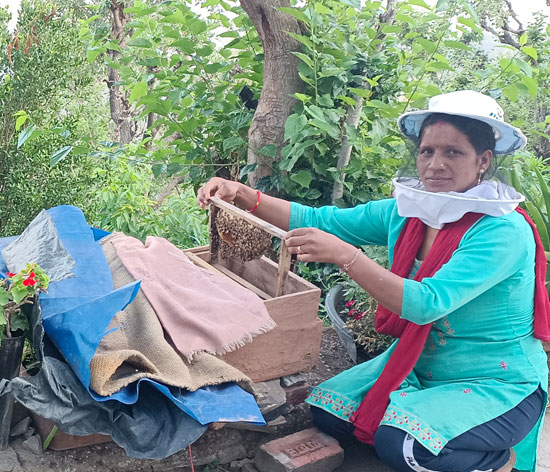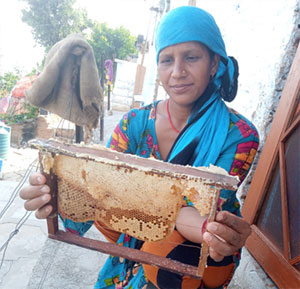
Hailing from the small village of Dugadda block in the Pauri Garhwal district of Uttarakhand, Pinky Devi was fortunate to have a traditional wall beehive in her home, yielding approximately 5 kg of honey each year. She typically sold only 3 kg of this harvest in the market, resulting in a an annual revenue of just Rs1,500. Although her home had two more wall hives, they remained vacant as they were in need of servicing and repair. Moreover, being afraid of bee stings, Pinky refrained from beekeeping activities, leaving this responsibility to the men in her family. Besides beekeeping, Pinky and her husband own 8 nali (1 nali is equal to 200 sq. metre) of farmland. Unfortunately, as the income generated from farming was insufficient, her husband eventually moved to Chandigarh to work at a private firm.
Building a beekeeping business
Eager to transform her existing beehives into a reliable source of income, Pinky joined a self-help group initiated by Himmotthan Society, an associate organisation of the Tata Trusts dedicated to enhancing the quality of life for communities residing in the hilly regions of India. Over the past five years, Himmotthan Society has implemented a key intervention aimed at strengthening the honey value chain in Uttarakhand. The intervention focused on training both new and experienced beekeepers in various aspects of beekeeping, such as the art of making mud hives, bee-catching techniques, and the use of modern machinery for honey extraction.
 |
| Empowering women through beekeeping and sustainable agriculture in Dugadda cluster |
Following the training sessions, Himmotthan Society assisted Pinky in repairing her two dormant beehives. They equipped her with all the essential supplies, including bee boxes and protective gear, significantly boosting her confidence in her ability to run her new beekeeping business. Officials from Himmotthan also helped her install three modern beehives and two mud hives. With a total of seven thriving beehives, all teeming with honeybees, Pinky is now producing an impressive 40 kg of honey annually! At the market rate of Rs550 per kg, she successfully earns an additional Rs19,200 a year – a substantial source of revenue for the mother of three.
A horticultural shift
Himmotthan Society officials also encouraged Pinky to cultivate chamomile and rosemary, as these plants would not only serve as a source of food for her bees but also open up an avenue for generating additional income. In a bold move, she decided to transform her onion and garlic patch into a chamomile and rosemary cultivation. The results have been phenomenal. The sale of these exquisite flowers now yields her nearly Rs20,000 per season – a stark contrast to the meagre Rs3,000 that she used to earn from the sale of onions and garlic. Cultivating aromatic herbs like chamomile and rosemary also offers the added advantage of being less susceptible to attacks by wild animals, thus safeguarding her crops from destruction.
Success that inspires
Tata Trusts’ intervention has led to a remarkable increase in honey production within Dugadda, with the average annual yield per household tripling from 6.7 kg to 17.3 kg. As for Pinky, she is now brimming with confidence. She has conquered her fear of bees and fearlessly manages various aspects of beekeeping, including honey extraction, beeswax preparation, and bee trapping.
“The best thing about my association with Himmotthan is that I am no longer dependent on my husband for money, which gives me a sense of control over my life,” she says. The combined revenue generated from honey, chamomile, and rosemary has not only improved the financial well-being of her family, but has also ignited her ambition to further expand her beekeeping enterprise. Her success has also inspired many other women in Dugadda cluster to engage in income-generating activities of their own and become self-reliant.
